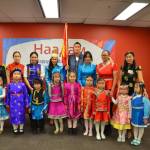As part of National Science Week, we chat with PhD researcher Holly Hosking about how her research could change the way we test for cancer risk.
What is your research project about?
Cancer and associated risk can be classified as a sporadic (random) cancer event or can be associated with inherited genetic mutations (familial or hereditary). The risk of developing a sporadic cancer can only be somewhat predicted through diet and lifestyle factors while familial cancers can be more accurately predicted through genetic testing. The effectiveness of current susceptibility testing is reliant on cancer type, family history and genetic mutation panels available for genetic screening. Genetic mutation screening is mostly cancer ‘type’ specific, requiring the patient’s health care professionals to have some indication of what genes to analyse. In many cancer families, however, there isn’t a defined cancer location or type present in all affected individuals, meaning that there is no known possible gene mutation available to test.
Even when gene mutation panels are available, positive tests for cancer gene mutations are rare. For example, to be tested for the hereditary breast cancer genes BRCA1 and BRCA2, multiple cases of breast and/or ovarian cancer on one side of the family is required before a genetic mutation screening will be considered for referral. Furthermore, only one in 10 BRCA1/BRCA2 tests are positive for the mutation leaving the remaining nine without further explanation of their cancer risk.
“Potentially my research could change the way we test for cancer risk.”
My research aims to discover cancer risk in patients that test negative for gene mutations, but have a family history of cancer. As previous research has found that many familial cancers are due to mutations in DNA repair genes, I aim to analyse DNA repair ability after intentionally damaging the DNA of white blood cells, using laboratory and cell culture methods.
By analysing the ability of cells to repair their DNA after intentionally inflicted damage, I’ll be able to assess repair capacity and potentially give patients an individualised cancer risk that is more than just a yes or no to the presence of a mutation.
What results have you got so far?
I’m actually still collecting data, so I haven’t got any results to report on yet. I’m always looking for more participants, so if you’d like to participate please contact me on [email protected].
I’m looking for people that fit one of the following criteria:
- No history of cancer or family history of cancer
- No history of cancer but have a family history of cancer
- History of cancer
What is the potential impact of your research?
Potentially my research could change the way we test for cancer risk. I’m hopeful that my research will be able to give people a better understanding of their risk of cancer by analysing their individual efficiency of DNA damage repair. This may be done as a separate or complementary test to genetic screens to give an indication of individual repair capacity or as a pre-screen prior to genetic tests potentially saving patients thousands on additional tests.
Have you always been interested in ‘science’?
I’ve always been curious about how things work and have loved science. For as long as I can remember, I’ve been particularly fascinated by the human body, disease and how medications work. After going on work experience in a research laboratory in grade 10 I decided I wanted to do a Doctor of Philosophy (PhD) and spent the rest of my schooling being called “Dr Holly” by my science teacher. It was also always an ongoing joke at family events that my family would say I was going to end up as a cancer researcher one day. I always thought it was a funny joke because I wasn’t smart enough for that … but here we are.
If you weren’t a researcher, what would you be?
Honestly, this is probably the hardest question because being a researcher has always been my dream. It’d definitely have to be something working in the medical or science field. If research and university academics was totally out of the picture, I’d probably go into cosmetic medicine. I honestly can’t picture myself doing anything but research and academic work however though!
Finally, what advice would you give young, aspiring scientists?
Pursue your dream! CQUniversity offers distance education all over the country so you’re never too far away to start pursuing your dream. Being outside of a major city and wanting to work in medical research was always a concern of mine, but now I’m working as a researcher in a regional area and I wouldn’t have it any other way.
Scientists love talking about their science! I know I personally love teaching people about my research and having students in my lab, so reach out and ask if you can come for a tour or some work experience, if you hear of someone working in an area you’re interested in.

